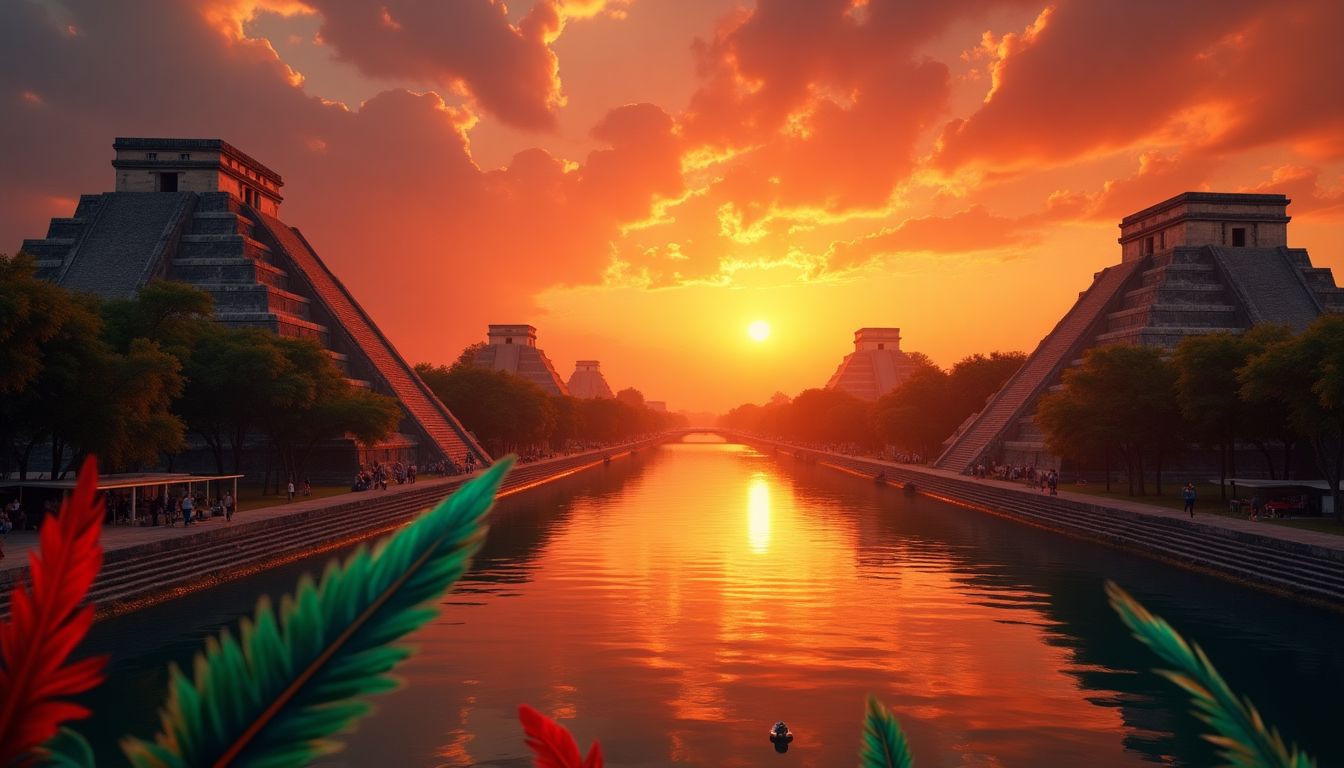The year was 1443, deep within the height of the Aztec Empire, where Tenochtitlán, the great city of canals and golden temples, rose proudly in the swirling mist of Lake Texcoco. The setting sun cast its orange hue across the water, illuminating the reflections of obsidian pyramids. Traders bustled in sprawling markets, and children chased one another under the watchful eyes of statues honoring the gods.
At the center of this living, breathing metropolis was Xochitl, a young woman of unusual stature and determination. Standing taller than most men, her lean, sinewy frame was built from years of labor in the fields and training as a warrior—a role traditionally rare for women but not unheard of in the Aztec world. Her skin bore the hue of fertile earth, her dark hair braided tightly and adorned with vibrant feathers of emerald quetzals and scarlet macaws. She wore a finely woven tilmatli, a cloak intricately embroidered with glyphs symbolizing eagles and jaguars, marking her as a part of the military elite.
The Unfolding Omen
Xochitl had returned from a skirmish at the northern borders when she noticed something strange. A fiery streak blazed across the sky as she gazed upward from her canoe gliding through the mirrored canals. The omen—a comet—was clear. Great change loomed on the horizon. Returning to her family compound, nestled near the outskirts of the bustling street markets, she shared her concerns with her younger brother, Cualli, an eager apprentice to the priests of Tezcatlipoca.
“The gods send signs, sister,” Cualli said, his narrow face lit by torchlight as he ground obsidian into powder. “Change must be embraced, whether it burns us or delivers us glory.”
Xochitl frowned, her fingers drumming against the wooden arm of her chair. “An easy sentiment for one who sits under temple roofs, learning riddles. For us who wield obsidian blades, it is not so simple.”
Their conversation was interrupted by rapid footsteps in the courtyard. A messenger entered, breathless and trembling. “Xochitl of the Jaguar Knights, the Tlatoani summons you to the Great Pyramid. It is urgent.”
A Conspiracy of Stars
Moments later, Xochitl stood in the shadow of the towering Pyramid of Huitzilopochtli, heart pounding. The Tlatoani himself, Moctezuma I, sat atop his obsidian throne in a chamber lit by golden torches. His elaborate headdress, adorned with jade and brilliant feathers, shimmered like the dawn. Around him sat his advisors, all murmuring nervously.
“The comet,” Moctezuma began gravely. “It heralds the arrival of strangers with pale skin. They will come from the sea, gods or invaders, I know not. Our priests speak of copper rings around the heavens and gods who disguise themselves in metal. You, Xochitl, are to lead an expedition eastward to where the sky touches the ocean. You must find the source of these omens.”
Though fearless by nature, Xochitl’s chest tightened. “I will go, Tlatoani,” she said, bowing deeply, knowing well that failure was not an option in the Aztec world, where the gods demanded success—or blood.
The Voyage of the Jaguar
Xochitl spent days gathering supplies for her journey. Accompanied by a small crew—five warriors and two translators fluent in coastal dialects—they ventured across mountain ranges thick with clouds and jungles alive with jaguars and venomous serpents. She wore her finest warrior garb: a jaguar helmet carved from obsidian, fitted with amber eyes and grinning fangs, and a ichcahuipilli, a quilted cotton armor resistant to arrows, secured with turquoise clasps. At her side hung her obsidian-edged macuahuitl—a weapon as deadly as the spear of any god.
The sea was unlike anything Xochitl had envisioned. The endless horizon felt both ominous and awe-inspiring as waves lapped at the sand. But what struck her more deeply was the copper shimmer that floated in the blue sky above. A strange ring circled the heavens, faint but unyieldingly present. It matched the priests’ descriptions—glittering, unnatural, and wholly alien to Mesoamerican understanding.
Then came the storm. A gale unlike any they had encountered whipped through the expedition. Waves collided with their canoes, and copper needles—needles of metal falling from the sky—began piercing the sand, the trees, and even the surf. The crew cowered, crying out to the gods as the heavens screamed with rage, scattering debris as though the stars themselves were breaking apart.
The Visitors
The storm ended abruptly, leaving an eerie calm. From the horizon emerged a sight even more fearsome: glinting monstrosities of foreign design floating across the water—ships unlike any Aztec canoe. From their decks spilled figures with pale faces and strange glimmering armor.
“Strangers,” Xochitl whispered, gripping her macuahuitl, her heart a maelstrom of fear and fury.
The figures did not appear like gods. They stumbled on the unfamiliar sand and barked incomprehensible words. Their leader was a woman, tall and imposing, her skin paler than moonlight. She had fiery red hair that streamed behind her like a banner, and her clothing was unlike anything Xochitl had seen—stitched leather and gleaming plates of iron that clanked softly as she moved. In her hands was a copper staff that pulsed faintly with red light.
Through their translators, the leader introduced herself as “Captain Eleanor of the Skyfarers.” She claimed to hail from lands beyond the stars, speaking of a world consumed by copper storms and debris, where her people sought refuge in realms untouched.
Xochitl neither trusted nor believed her. Yet Eleanor offered trinkets that glimmered like captured stars and spoke of alliances. Still, the Aztec warrior could see the hunger of desperation glittering in her sky-colored eyes. These were not gods—they were invaders.
A Choice Forged in Obsidian
In the days that followed, Xochitl had to decide the fate of these strangers. Cualli’s words from weeks ago echoed in her mind: “Change must be embraced.” But welcoming it now might lead to ruin, not glory. The gods’ omens had brought these outsiders, yet it was her blade that held the power to determine their place in this new world.
That night, under the eerie copper ring in the sky and the watching eyes of the stars, Xochitl stood before the gathered strangers and her warriors. Her hand rested firmly on the hilt of her macuahuitl. The future, once a simple ribbon of promises, now seemed like a jagged constellation of choices.
“You who fall from the skies, you will kneel or you will perish,” Xochitl declared, her voice carrying over the crashing waves. And in that moment, the destiny of two worlds trembled, waiting for the dawn to decide their fates.
The jaguar of Tenochtitlán had roared, and it would not be silenced.
The Source...check out the great article that inspired this amazing short story: Probably the Worst Idea in the History of the Space Age Technology
Disclaimer: This article may contain affiliate links. If you click on these links and make a purchase, we may receive a commission at no additional cost to you. Our recommendations and reviews are always independent and objective, aiming to provide you with the best information and resources.
Get Exclusive Stories, Photos, Art & Offers - Subscribe Today!

























Post Comment
You must be logged in to post a comment.